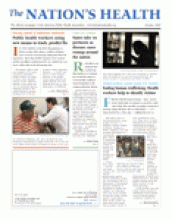Your throat feels scratchy and you have the sniffles. The folks at work have been passing around a cold, and now you have it. Your first thought is to rush to the doctor for antibiotics. In the past, coming home with a prescription somehow made you feel better. After all, antibiotics are strong medicines and they have saved many lives. But what you might not know is that antibiotics only work against infections caused by bacteria. Antibiotics don’t work against infections caused by viruses. The flu and common colds are caused by viruses, so those sniffles and aches aren’t going to be cured by an antibiotic.
“We tell patients and parents to understand that antibiotics only treat bacterial illnesses — they don’t treat viruses,” says Lauri Hicks, DO, medical director for the U.S. Centers for Disease Control and Prevention’s Get Smart: Know When Antibiotics Work campaign. “Most upper respiratory infections are caused by viruses. A very small percentage of upper respiratory infections are caused by bacteria, and antibiotics are completely ineffective for treatment of viral infections.”

With the discovery of the antibiotic penicillin in 1928, medicine gained a lifesaving tool that greatly reduced illness and death from infectious diseases. Unfortunately, since then, antibiotic resistance has grown, and public health workers worry that if they aren’t used correctly, some antibiotics will stop working. Taking antibiotics when they are not needed or misusing them increases the risk that an infection you get later will resist antibiotic treatment.
Some of the other common viral infections that shouldn’t be treated with antibiotics are most coughs and bronchitis, sore throats — except for strep throat — and some ear infections. Studies show that health care providers are more likely to prescribe antibiotics when their patients press for them, so it’s important for patients and parents to be aware of the limitations of antibiotic treatments and not pressure health care providers to prescribe them when they are not needed.
>> Fact: Neither the flu nor the common cold can be treated by antibiotics.
Photos courtesy iStockphoto: by Sean Locke, Kim Gunkel, Melinda Fawver, Steve Cole
An ounce of prevention
You went to your health care provider today and it turns out you have a bacterial sinus infection. The antibiotic prescription you were given to deal with the infection was dutifully filled by your neighborhood pharmacist. Before taking an antibiotic, tell your health care provider about other medications or herbal remedies you’re taking, as they may interact with your prescription. Read the information that comes with your antibiotics and take the drugs exactly as you are directed.
You’ll probably start feeling better in a few days, but you still need to finish the prescribed course of treatment. Don’t skip doses. Not taking your full course of drugs increases the chance that the bacteria will become resistant to future treatments.
Remember that if your health care provider prescribes antibiotics, they are yours and yours alone. Sharing antibiotics with other people puts you and others at risk. The dose you were given was likely selected based on your age and body weight.

Also, antibiotics have very specific indications for specific illnesses. One antibiotic may be indicated for a urinary tract infection, but it may not work for another type of infection. Taking the wrong medicine may allow bacteria to multiply.
As with any drug, antibiotics can cause reactions, so tell your doctor right away if you experience any symptoms or side effects.
Wielding the power of the pen
Consumers can play a big role in helping to reverse the crisis of antibiotic resistance, but they are only half the equation. Health care providers can curb the inappropriate use of antibiotics by not prescribing them for illnesses that the drugs don’t treat, such as colds and flu. Decreasing inappropriate antibiotic use is the best way to control resistance.
“Physicians have the power of the pen,” says Ed Septimus, MD, a spokesman for the Infectious Diseases Society of America. “We all need to be telling patients the same message, which is that antibiotics for viral infections are unnecessary.”
CDC’s Get Smart: Know When Antibiotics Work campaign, online at www.cdc.gov/getsmart, offers brochures, tipsheets, posters and other resources health care providers can use to educate their patients.
>> For more tips on using antibiotics, visit www.cdc.gov/getsmart
- Copyright The Nation’s Health, American Public Health Association











